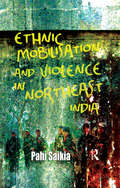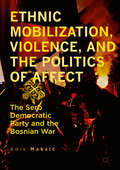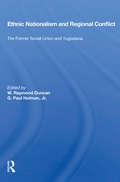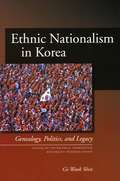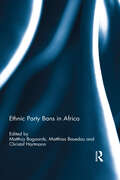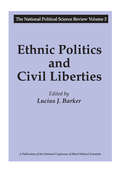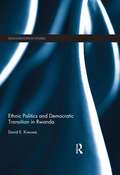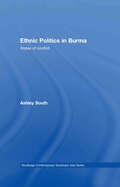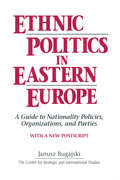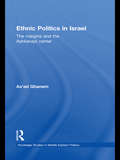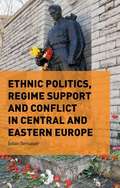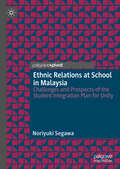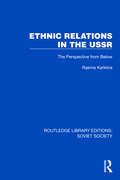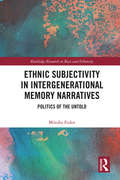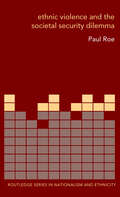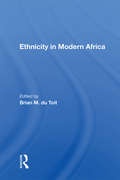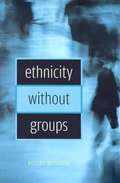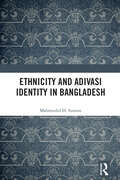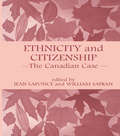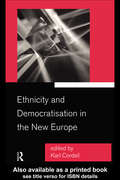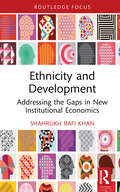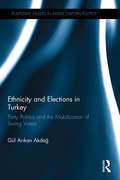- Table View
- List View
Ethnic Mobilisation and Violence in Northeast India
by Pahi SaikiaThe book is a very detailed work on the relationship between movements for autonomy by indigenous peoples (the so-called ‘tribes’) and violence in Assam, in northeast India. The book addresses some of the reasons for the failure of ethnic conflict management and for the frequent emergence of violence in the region. In particular, the historical description of movements by the Dimasas, Misings and Bodos is well compiled and provides a good summary for the readers. At the same time, the work offers a good understanding of ethnic violence in contemporary India.The volume offers some new research data based on comparative analysis of different trajectories followed by three important movements among Assam’s ethnic minorities. While the pieces of the argument are based on the existing literature on ethnic violence and contentious politics, they are effectively connected to materials drawn from northeast India. Furthermore, the book raises significant concerns on the debates on crafting of decentralised institutions and executive opportunities that may facilitate ethnic accommodation thereby reducing the likelihood of such groups to pursue their goals through channels that are radical or extreme.
Ethnic Mobilization, Violence, and the Politics of Affect: The Serb Democratic Party and the Bosnian War
by Adis MaksićThis book offers an unprecedented account of the Serb Democratic Party’s origins and its political machinations that culminated in Europe’s bloodiest conflict since World War II. Within the first two years of its existence, the nationalist movement led by the infamous genocide convict Radovan Karadzic, radically transformed Bosnian society. It politically homogenized Serbs of Bosnia-Herzegovina, mobilized them for the Bosnian War, and violently carved out a new geopolitical unit, known today as Republika Srpska. Through innovative and in-depth analysis of the Party’s discourse that makes use of the recent literature on affective cognition, the book argues that the movement’s production of existential fears, nationalist pride, and animosities towards non-Serbs were crucial for creating Serbs as a palpable group primed for violence. By exposing this nationalist agency, the book challenges a commonplace image of ethnic conflicts as clashes of long-standing ethnic nations.
Ethnic Nationalism And Regional Conflict: The Former Soviet Union And Yugoslavia
by W. Raymond Duncan G. Paul HolmanThis book examines ethnic conflicts of the former Soviet Union to indicate how turbulent the world has become in the post-Cold War era-and how difficult it has been to craft western security policies to address the turmoil. The author hopes to stimulate new thinking about international security.
Ethnic Nationalism in Korea: Genealogy, Politics, and Legacy (Studies of the Walter H. Shorenstein Asia-Pacific Research Center)
by Gi-Wook ShinThis book explains the roots, politics, and legacy of Korean ethnic nationalism, which is based on the sense of a shared bloodline and ancestry. Belief in a racially distinct and ethnically homogeneous nation is widely shared on both sides of the Korean peninsula, although some scholars believe it is a myth with little historical basis. Finding both positions problematic and treating identity formation as a social and historical construct that has crucial behavioral consequences, this book examines how such a blood-based notion has become a dominant source of Korean identity, overriding other forms of identity in the modern era. It also looks at how the politics of national identity have played out in various contexts in Korea: semicolonialism, civil war, authoritarian politics, democratization, territorial division, and globalization.
Ethnic Party Bans in Africa (Democratization Special Issues)
by Matthijs Bogaards Christof Hartmann Matthias BasedauIn Sub-Saharan Africa, the spread of democracy since the 1990s has been accompanied by the proliferation of bans on ethnic political parties. A majority of constitutions in the region explicitly prohibit political parties to organize on the basis of race, ethnicity, religion, region and other socio-cultural attributes. More than a hundred political parties have been dissolved, suspended or denied registration on these grounds. This book documents the experience with ethnic party bans in Africa, traces its origins, examines its record, and answers the question whether ethnic party bans are an effective and legitimate instrument in the prevention of ethnic conflict.This book was published as a special issue of Democratization.
Ethnic Patriotism and the East African Revival
by Derek R. PetersonEthnic Patriotism and the East African Revival shows how, in the era of African political independence, cosmopolitan Christian converts struggled with east Africa's patriots over the definition of culture and community. The book traces the history of the East African Revival, an evangelical movement that spread through much of eastern and central Africa. Its converts offered a subversive reading of culture, disavowing their compatriots and disregarding their obligations to kin. They earned the ire of east Africa's patriots, who worked to root people in place as inheritors of ancestral wisdom. This book casts religious conversion in a new light: not as an inward reorientation of belief, but as a political action that opened up novel paths of self-narration and unsettled the inventions of tradition.
Ethnic Politics and Civil Liberties (National Political Science Review Series #Vol. 3)
by Lucius J. BarkerThe official publication of the National Conference of Black Political Scientists, this annual publication includes significant scholarly research reflecting the diverse interests of scholars from various backgrounds who use a variety of models, approaches, and methodologies. The central focus is on politics and policies that advantage or disadvantage groups because of race, ethnicity, sex, or other such factors. The research is performed in a variety of contexts and settings. This third volume includes an introductory note by the editor, Lucius J. Barker, in which he assesses the performance of the Journal in defining a "different political science" and a note by incoming editor Matthew Holden, Jr. outlining topics and agendas for future volumes. Feature articles include "Reconceptualizing Urban Violence"; "Political Science and the Black Political Experience"; "The Impact of At-Large Elections on the Representation of Black and White Women"; "State Responses to Richmond v. Croson: A Survey of Equal Opportunity Officers"; "Media in Warsaw Pact States: Explanations of Crisis Coverage"; and "Presence of Immigrants and National Front Vote: The Case of Paris (1984-1990)." The Book Review Section includes review essays on East European research, black urban politics, and the political reincorporatlon of southern blacks, and regular book reviews on minority groups and American political culture and other areas.
Ethnic Politics and Democratic Transition in Rwanda (Democratization and Autocratization Studies)
by David E. KiwuwaThis book offers an examination of how a deeply divided post-conflict society embarks on democratic transition. Using Rwanda as the case study, it combines analysis of democratic transition and ethnopolitical debate, asking why deeply divided ethnic societies have a tendency to fail. Though marginalised in existing literature on democratic transition, this path-breaking book shows how ethnicity has a significant impact on the direction and success of democratic process. The initial failure of democratic transition in Rwanda shows that the current regime will need to be sensitive to ethnicity, ethnopolitical consciousness and mobility in order to be successful in its second transition attempt. Based on key informant interviews, participant observation and primary resources, this book develops beyond the case study of Rwanda to posit a new framework that integrates variables of unity, equality, trust and institutional engineering in an integrative model to study and evaluate democratic transition in divided or post-conflict society. Ethnic Politics and Democratic Transition in Rwanda will be of interest to students and scholars of democratization, democracy, and ethnic politics and conflict.
Ethnic Politics and State Power in Africa
by Philip RoesslerWhy are some African countries trapped in vicious cycles of ethnic exclusion and civil war, while others experience relative peace? In this groundbreaking book, Philip Roessler addresses this question. Roessler models Africa's weak, ethnically-divided states as confronting rulers with a coup-civil war trap - sharing power with ethnic rivals is necessary to underwrite societal peace and prevent civil war, but increases rivals' capabilities to seize sovereign power in a coup d'#65533;tat. How rulers respond to this strategic trade-off is shown to be a function of their country's ethnic geography and the distribution of threat capabilities it produces. Moving between in-depth case studies of Sudan and the Democratic Republic of the Congo based on years of field work and statistical analyses of powersharing, coups and civil war across sub-Saharan Africa, the book serves as an exemplar of the benefits of mixed methods research for theory-building and testing in comparative politics.
Ethnic Politics in Burma: States of Conflict (Routledge Contemporary Southeast Asia Series)
by Ashley SouthThis book examines the ideas which have structured half a century of civil war in Burma, and the roles which political elites and foreign networks - from colonial missionaries to aid worker activists - have played in mediating understandings of ethnic conflict in the country. The book includes a brief overview of precolonial and colonial Burma, and the emergence ethnic identity as a politically salient characteristic. It describes the struggle for independence and the parliamentary era (1948-62), and the quarter century of military-socialist rule that followed (1962-88). The book analyses the causes, dynamics and impacts of on-going armed conflict in Burma, since the 1988 'democracy uprising' through to the 2007 'saffron revolution' (when monks and ordinary people took to the streets in protest against the military regime). There is a special focus on the plight of displaced people, and the ways in which local and international agencies have responded. The book also examines one of the most significant, but least well-understood, political developments in Burma over the last twenty years: the series of ceasefires agreed since 1989 between the military government and most armed ethnic groups. The positive and negative impacts of the ceasefires are analysed, including a study of civil society among ethnic nationality communities. This analysis leads to a discussion of the nature of social and political change in Burma, and a re-examination of some commonly held assumptions regarding the country, including issues of ethnicity and federalism. The book concludes with a brief Epilogue, taking account of Cyclone Nargis, which struck Burma on 2 and 3 May 2008, resulting in a massive humanitarian crisis.
Ethnic Politics in Eastern Europe: A Guide to Nationality Policies, Organizations and Parties
by Janusz BugajskiThis guide charts national histories and policies, relevant statistics and chronologies, and the identities, programmes, and activities of the full spectrum of ethnically-based parties and organizations in Central and Eastern Europe.
Ethnic Politics in Israel: The Margins and the Ashkenazi Centre (Routledge Studies in Middle Eastern Politics)
by As'ad GhanemThis book offers an analysis on contemporary Israeli democracy, examining in particular society and politics from the perspectives of the different ethnic groups outside of the Ashkenazi mainstream. The book explores the political expressions of the secondary groups in Israel (Mizrahim, Religious, Russians and Palestinian-Arab) and how these groups where treated by the Ashkinazim as a threat to its hegemony over the state. Looking at the instability created by the struggle of these marginal groups against the state, and the discrimination policy practiced by the Ashkenazi 'hegemonic ethnic state' regime against the other, non-Ashkenazi, groups, the book illustrates how this has contributed to the failure to establish an ‘Israeli people’. Ethnic Politics in Israel will be of great interest to students and researchers in the fields of Middle East, Palestinian, Arab, Jewish and Israeli studies, political science, sociology and psychology.
Ethnic Politics, Regime Support And Conflict In Central And Eastern Europe
by Julian BernauerEthnicity and ethnic parties have often been portrayed as a threat to political stability. This book challenges the notion that the organization of politics in heterogeneous societies should overcome ethnicity. Rather, descriptive representation of ethnic groups has potential to increase regime support and reduce conflict.
Ethnic Relations at School in Malaysia: Challenges and Prospects of the Student Integration Plan for Unity
by Noriyuki SegawaThis book considers the impact of the Rancangan Integrasi Murid Untuk Parpaduan (RIMUP: Student Integration Plan for Unity), the program developed as a driver towards Malaysian national integration and intended to promote an ideal of ‘unity in diversity’ through enhancing ethnic interaction in primary schools. Based on interview research with government departments, NGOs, and stakeholders at primary schools, this book highlights three main structural challenges to success of the RIMUP: the government’s weak management; the short duration and low frequency of an activity; and low student participation rate. The book also provides concrete suggestions to develop the RIMUP, to improve ethnic relations and to shape the future direction of education policies for the development of national integration, making a significant contribution to Malaysian studies as well as education policy in multi-ethnic countries.
Ethnic Relations in the USSR: The Perspective from Below (Routledge Library Editions: Soviet Society)
by Rasma KarklinsEthnic Relations in the USSR (1986) focuses on popular ethnic attitudes and behaviour among the various nations and nationalities of the Soviet Union. Ethnicity matters not only in Soviet high politics and in economic and cultural planning, but is also a dominant force in the daily lives of many Soviet citizens. Using a combination of political and sociological methods, the author draws out the patterns and determinants of ethnic relations among the major nationalities at both the group and individual levels.Co-winner of the 1987 American Political Science Association Ralph E. Bunche Award
Ethnic Struggle, Coexistence, and Democratization in Eastern Europe
by Sherrill StroscheinIn societies divided on ethnic and religious lines, problems of democracy are magnified – particularly where groups are mobilized into parties. With the principle of majority rule, minorities should be less willing to endorse democratic institutions where their parties persistently lose elections. While such problems should also hamper transitions to democracy, several diverse Eastern European states have formed democracies even under these conditions. In this book, Sherrill Stroschein argues that sustained protest and contention by ethnic Hungarians in Romania and Slovakia brought concessions on policies that they could not achieve through the ballot box, in contrast to Transcarpathia, Ukraine. In Romania and Slovakia, contention during the 1990s made each group accustomed to each other's claims and aware of the degree to which each could push its own. Ethnic contention became a de facto deliberative process that fostered a moderation of group stances, allowing democratic consolidation to slowly and organically take root.
Ethnic Subjectivity in Intergenerational Memory Narratives: The Politics of the Untold (Routledge Research in Race and Ethnicity)
by Mónika FodorIn this interdisciplinary study, Mónika Fodor explores how intergenerational memory narratives embedded in the speaker's own stories impact ethnic subjectivity construction. Working with thematically selected life experiences from interviews conducted with second- and late-generation European-Americans, Fodor demonstrates how the storytellers position themselves in a range of social, cultural, and political discourses to claim or disclaim ethnicity as part of their subjectivity. Tying narrative content, structural, and performance analysis to the sociological and sociolinguistic concepts of "symbolic capital" and "investment," Fodor unpacks the changing levels of identifying with one’s ancestral ethnic heritage and its potential to carry meaning for late-generation descendants. In doing so, she reveals the shared features of identification among individuals through narrative meaning-making, which may be the basis of real or imagined, heterolocal discourse community formation and sustained ethnic subjectivity. The narrative analysis demonstrates how the cohesive force among members of the community is the shared knowledge of story frames and the personalized retelling of these. Ethnic Subjectivity in Intergenerational Memory Narratives draws on inherited, often moving, personal experiences that offers new insights into the so far largely unexplored terrain of the narrative structure of intergenerationally transferred memory retellings, that will be of great interest to students and scholars of ethnic studies, migration and identity studies.
Ethnic Violence and the Societal Security Dilemma (Routledge Studies in Nationalism and Ethnicity)
by Paul RoeEthnic Violence and the Societal Security Dilemma explores how the phenomenon of ethnic violence can be understood as a form of security dilemma by shifting the focus of the concept away from its traditional concern with state sovereignty to that of identity instead. The book includes case studies on:* ethnic violence between Serbs and Croats in the Krajina region of Croatia, August 1990* ethnic violence between Hungarian and Romanians in the Transylvania region of Romania, March 1990.
Ethnicity In Modern Africa
by Brian M. du ToitThe fifteen essays written for this volume reflect the increasing importance for social scientists of ethnic, rather than physical or tribal, criteria for classifying modern population groups. The authors—from South Africa, the United States, South West Africa (Namibia), Nigeria, and Scotland—cover most of Africa south of the Sahara. They consider the range from large national population groupings to small-scale societies attempting to maintain their social boundaries, and discuss such topics as emergent nationalism, ethnic divisiveness, social distance, voluntary association, and the role of women. The first section is concerned with particular communities, peoples, and ethnic groups, and treats traditional tribal groupings as well as communities delineated on phenotypic grounds. In the second section, the focus turns to modern situations of interaction; the two major themes discussed here are situational ethnicity and situational realignment. The third section deals with color, one of the physical criteria of ethnic identification; here the authors discuss the political and legal implications of a system based on color. The last essay reports on current changes in attitude and organization within the countries of white-ruled southern Africa.
Ethnicity Without Groups
by Rogers BrubakerThat ethnicity is constructed is commonplace; this volume provides new insights into how it is constructed. By shifting the analytical focus from identity to identifications, from groups as entities to group-making projects, from shared culture to categorization, from substance to process, Brubaker shows that ethnicity, race, and nation are not things in the world but perspectives on the world: ways of seeing, interpreting, and representing the social world.
Ethnicity and Adivasi Identity in Bangladesh
by Mahmudul H. SumonThis book explores the transitions in the adivasi identity as well as in the political representation of adivasi communities in Bangladesh. It traces the use of categories such as “primitive”, “tribe”, and “adivasi” in post-colonial Bangladesh, both in the political discourse and in everyday life. The volume studies the history of these essentialized categories used for indigenous communities within the hierarchies of power and identity. It also analyses the diverse articulations of indigeneity through ethnographic narratives, exploring the formations of newer traditions and identity. The author highlights the persistence of the terms “simple” and “primitive” in contemporary discourses while also sharing examples of complex mediations and appropriation of these categories by adivasi groups in Bangladesh. This book will be of interest to researchers and students of sociology, social ethnography, social and cultural anthropology, indigenous studies, exclusion studies, development studies, political sociology, and South Asian studies.
Ethnicity and Citizenship: The Canadian Case (Routledge Studies in Nationalism and Ethnicity)
by William Safran Jean LaponceExamining past and present policies on immigration, current arguments regarding the evolution of the Canadian constitutional system and the continuing search for new definitions of citizenship; this book looks at the components of citizenship in Canada and the diversity of attitudes.
Ethnicity and Democratisation in the New Europe
by Karl CordellA broad-ranging study that explores the complex relationship between ethnicity and democratization, focusing on specific case studies including France, Spain, Slovakia, the Czech Republic, Russia, Albania and Hungary. Marrying the empirical and theoretical, the book begins by conceptualizing the nature of ethnicity and relating these ideas to different theories of democracy and democratization. The contributors locate ethnic experiences within a series of common frameworks to shed light on key issues such as: * the effect of democratization and authoritarian rule on ethnic tensions * the extent to which ethnicity is constructed as an ideological tool * whether democracy can only function if all citizens are fully assimilated.
Ethnicity and Development: Addressing the Gaps in New Institutional Economics (Routledge Studies in the Growth Economies of Asia #154)
by Shahrukh Rafi KhanEthnicity and Development explores the impact of ethnic fragmentation on the success or failure of nations and uses case studies of Bangladesh and Pakistan to illustrate this. It analyzes the role of institutions in engendering economic and social progress and challenges the New Institutional Economics (NIE) narrative. The book argues that the NIE narrative has some gaps, particularly that it is blind to ethnic fragmentation and therefore does not account for the construction of institutions that can build national cohesion in low- and low-middleincome countries (L/LMICs). It shows that L/LMICs have a different cultural context and that they need to first build national cohesion on a foundation of horizontal – across ethnic groups – and vertical – across classes – equity. The author’s analysis also examines other novel issues, such as the boost that is provided by nations acquiring the right of self-determination. Other novelties are the distinction between prime causes (triggers) for economic development and approaches for economic development. More important for this book is the distinction between natural and constructed nations and the conceptual framework presented to analyze their performance. Finally, the study examines the creation of national cohesion in ethnically diverse nations. Addressing a gap in the literature, this book will be of interest to researchers in development economics, political science and sociology and specialists in comparative politics/political theory with a focus on Area Studies.
Ethnicity and Elections in Turkey: Party Politics and the Mobilization of Swing Voters (Routledge Studies in Middle Eastern Politics)
by Gul AkdagEthnicity and Elections in Turkey attempts to understand the mobilization strategies of incumbent parties to consolidate and increase their support among swing voters of an ethnic group. By analyzing the strategy of AKP on voters of Kurdish origin, it investigates the conditions under which it can mobilize them through the clientelistic network and its effectiveness in increasing support for the party. This investigation is conducted through a district and neighborhood level case study conducted in the districts of Beyoğlu, Sancaktepe and Beykoz situated in Istanbul. The main hypotheses are tested through five different steps. Firstly, an examination of electoral results identifies a large number of voters of Kurdish origin as ideologically close to pro-Islamist and pro-Kurdish parties. Secondly, the book identifies the main organs responsible of mobilizing voters and defines the nature of the clientelistic network. Thirdly, the study suggests that the incorporation of these voters into the party’s clientelistic network is a function of the number and time of entry of activists of Kurdish origin in the party’s ranks and the intensity of their contacts with the voters. Fourthly, it reveals the effectiveness of clientelistic mobilization in consolidating and increasing support among swing voters of Kurdish origin. Lastly, the inner party organization and critical juncture experienced by the party are argued to be influential in its ability to increase its network through the incorporation of new activists. Providing an alternative explanation of AKP’s electoral success in Turkey, this book is essential reading for students and scholars with an interest in Middle East politics, political parties and political science.
